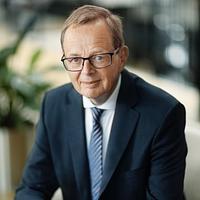We meet at a time of profound uncertainty – and at a time where our ability to stand together and take the right decisions will define the future of Europe.
Our future.
Technological disruption, geopolitical uncertainty, and the climate transition are reshaping the global economy more quickly - and possibly in more fundamental ways than we expected just some years ago.
In this situation, we are called upon to provide clarity, stability, and direction.
In moments like this it might be appropriate to return to one of Copenhagen’s most enduring thinkers—Søren Kierkegaard— who is known for the following thoughts:
“Life can only be understood backwards; but it must be lived forwards.”
Kierkegaard was neither a finance minister nor a central banker, so of course his deliberations should be taken with some caution.
But he understood the tension between reflection and action. He believed that while we must learn from the past, we cannot remain in it.
We must move forward—often without certainty, but always with purpose.
I think that this understanding was already a fundamental part of our first working session this afternoon on the need for better and simpler financial regulation.
And I trust that this will be the case also for the working sessions tomorrow on the highly important topics on productivity and geoeconomic fragmentation.
Kierkegaard also believed in the power of walking.
He was known for walking around Copenhagen for hours every day. He once wrote that he “walked himself into his best thoughts.”
Walking was a means for him to make sense of the world.
We too have a necessary walk to take - through complexity, through disagreement, through change.
Like Kierkegaard, we must keep moving.
Let me therefore in this spirit reflect on three key themes of our meeting – which are all areas where we must walk forward together, understand things backwards, and act for a better world going forward.
Better Financial Regulation
Understanding the past is essential for creating appropriate financial regulation.
We have learned—sometimes painfully—that markets need guardrails, that transparency matters, and that trust is hardwon and easily lost.
The present strength of our credit institutions is to a large extent the result of the financial regulatory initiatives taken since the great financial crisis.
And we should not throw the baby out with the bathwater.
But living forward means adapting to the lessons that we have learned and to new realities.
The financial system is evolving rapidly: digital assets, decentralized finance, AI-driven trading, and new forms of risk are emerging.
And there is a clear need for more smoothly provided financing. Our regulatory frameworks must evolve accordingly.
This afternoon we reached a better understanding of the direction and the character of the path we now need to walk together.
The Need for Improved Productivity
Europe’s productivity challenge is not new—but it has become more urgent.
We are falling behind in key sectors. From digital infrastructure to advanced manufacturing. And the gap is not just between us and our global competitors—it is also within our own Union.
Kierkegaard’s walks were solitary, but our path forward must be done together.
Productivity is about investing in skills, in education, in research and innovation.
It is about empowering our companies, unlocking capital markets, and putting new effort into removing the barriers that still hold back our single market.
All this involves important political choices – choices that must be made if we are to secure long-term prosperity for all Europeans.
I trust that – also on this theme - the discussions tomorrow will contribute to give us a better understanding of the direction and the character of the path we should walk together.
Geoeconomic Fragmentation
Perhaps the most complex challenge we face is growing fragmentation.
The post-war consensus on open markets and multilateralism is under strain. Strategic dependencies—on energy, on raw materials, on technology—have become vulnerabilities. Not to men tion the related challenges in security and defense.
In this environment, Europe must walk a careful line. We must remain open but not exposed. Strategic, but not insular.
We must build resilience - through diversification, through investment, and through cooperation.
And we must do so without losing sight of who we are.
Europe’s strength has always been its ability to turn diversity into unity. To act not as 27 separate economies, but as one Union with shared interests and shared values.
Kierkegaard once said that “anxiety is the dizziness of freedom.”
And perhaps that captures our moment well. We are – at least to a very large extent - free to shape our future. But that freedom comes with uncertainty, with risk, and with responsibility.
Fortunately, we are not walking alone.
The strength of the European Union lies in its ability to bring together different voices and different perspectives - and to turn them into our own common purpose.
That is what makes meetings like this so vital. They are not just about policy. They are about trust. And about building relationships that allow us to move forward, even when the path is unclear.
So tonight, as we share this meal, let us also share ideas.
Let us – in the spirit of Kierkegaard - reflect on the past but commit to living, and leading, forward.
Thank you very much. Skål—and bon appétit!
